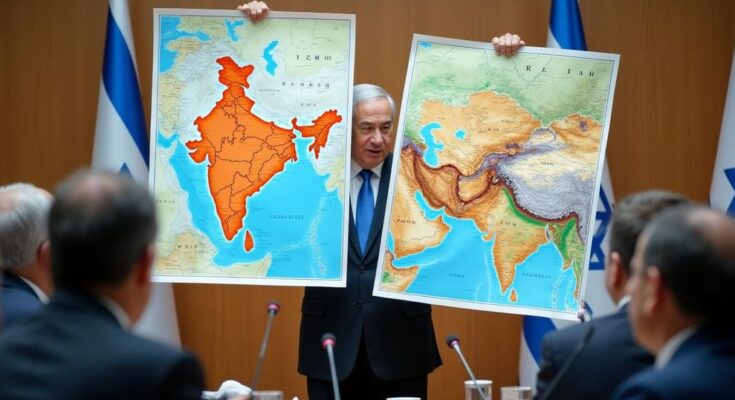At the UNGA, Israeli PM Benjamin Netanyahu displayed two maps, portraying India as a “Blessing” for cooperation and Iran as a “Curse” representing terror. He urged for sanctions against Iran due to its aggression and support for militant groups, asserting a readiness to respond to any provocations from Tehran.
During the recent United Nations General Assembly (UNGA), Israeli Prime Minister Benjamin Netanyahu showcased two maps, categorizing India as a “Blessing” and Iran as a “Curse.” This presentation came amid escalating tensions with Iran. Netanyahu’s representation of the “Blessing” map highlighted a vision for cooperation among Israel and its Arab partners, creating a land corridor linking the Indian Ocean with the Mediterranean Sea. Conversely, the “Curse” map illustrated what Netanyahu described as an “arc of terror” engineered by Iran, extending from the Indian Ocean to the Mediterranean, which included territories such as the West Bank, Gaza, and Syria’s Golan Heights marked as Israeli territory. The maps served as a visual component in Netanyahu’s broader plea for international support in implementing sanctions against Iran and thwarting its nuclear ambitions. He asserted, “For too long the world has appeased Iran; it turns a blind eye to its internal repression, it turns a blind eye to external aggression. That appeasement must end and that appeasement must end now.” In referring to Iran’s backing of the Hezbollah group and the recent Israeli airstrikes in Lebanon, Netanyahu warned, “I have a message for the tyrants of Tehran. If you strike us, we will strike you. There is no place in Iran where the long arm of Israel cannot reach. And that is true for the entire Middle East.” The rising tensions between Israel and Iran were exacerbated following the assassination of Hamas’ leader Ismail Haniyeh in Tehran in July, which Iran condemned as a “flagrant war crime.”
The ongoing conflict between Israel and Iran has intensified in recent years, spurred by mutual animosity and regional geopolitical dynamics. Iran’s support of militant organizations such as Hezbollah poses a significant threat to Israeli security, while Israel’s military operations against perceived Iranian threats have escalated tensions. Netanyahu’s recent statements at the UNGA highlight a critical moment in this adversarial relationship, emphasizing the need for global solidarity against Iranian influence and military capabilities in the region.
In summary, Prime Minister Netanyahu’s presentation at the UNGA, featuring two contrasting maps that depict India as a favorable ally and Iran as a dire threat, emphasizes Israel’s strategic vision and security concerns. His call for international sanctions against Iran reflects a desire to galvanize global action to counter Iran’s growing influence and military support for groups like Hezbollah. The harsh rhetoric directed at Tehran underscores the precarious nature of relations between the two nations and the broader implications for Middle Eastern stability.
Original Source: www.hindustantimes.com




